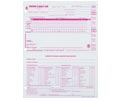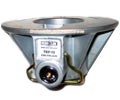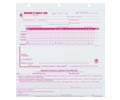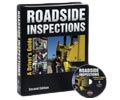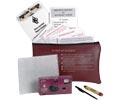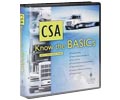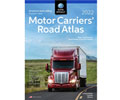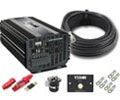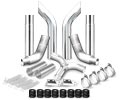Comprehensive Safety Analysis (CSA) - Frequently Asked Questions
Applicability | Data | Drivers | Interventions | Peer Groups | Regulations | Size & Weight | Timeline | Violations and Violation Scoring | Visibility
Applicability
Q: Which carriers are affected by CSA?
A: Any interstate carrier that has a US DOT number is covered by the CSA program, no matter what "type" of carrier they are (for-hire, private, flatbed, van, utility, construction, etc.), what size carrier they are, or what type of vehicles they operate (CDL required versus non-CDL required vehicles).
Q: Is there a way I can file for a waiver and not participate in the CSA program?
A: No. There are no waivers. Any interstate carrier that has a US DOT number will be involved in the CSA program.
Q: How does CSA affect Canadian and Mexican carriers?
A: Any interstate carrier with a US DOT number will be involved in the CSA program, no matter where they are domiciled. However, only accidents and violations that occur in the US will be counted in the data collection and evaluation system. The same is true of US carriers operating in Canada or Mexico (only violations that occur in the US will be counted in the carrier's data and evaluation).
Q: Is there a minimum size of company that will be included in the CSA program?
A: Any interstate carrier that has a US DOT number, no matter what size, will be included in the program.
Q: If a carrier has multiple locations, which state will be in charge of a carrier in the CSA system?
A: The carrier's principal place of business listed on the MCS-150 will determine which state office will be responsible for the carrier.
Q: Will shippers, brokers, and importers (in the case of overseas containers) be held responsible for any violations (such as overweight or overhour violations caused by "shipper pressure")?
A: No. Carriers and their drivers (if the violation is one the driver was responsible for or could have prevented) are who will be held responsible for violations in the CSA systems.
Q:Will repair vendors be held responsible for violations found on vehicles that they have reported to the carriers as ready to operate?
A:No. Carriers and their drivers (if the violation is one the driver was responsible for or could have prevented) are who will be held responsible for violations in the CSA systems.
Back to Top | Get CSA Solutions Now!
Data
Q: Will drivers and carriers "start from scratch" when the CSA system begins measuring and evaluating carriers?
A: No. The CSA measurement system will use the existing data (roadside inspection and crash information) from the previous 24 months (36 months for drivers) when it becomes the official measurement system.
Q: Will data eventually "fall off" of the system, or will violations and crashes be counted against a carrier or driver rever?
A: The measurement system will use the previous 24 month's worth of data when calculating a carrier's BASIC Scores. Anything older than 24 months will not be used (for drivers it is the last 36 months of data).
Q: What data will CSA use to track, measure, and evaluate carriers?
A: The CSA systems will use the following:
- Crash reports provided by the states for DOT recordable crashes.
- Roadside inspection reports provided by the states, and all violations listed on the reports.
- Violations discovered during interventions conducted by state or federal investigators.
Back to Top | Get CSA Solutions Now!
Drivers
Q: Does the driver component of CSA only apply to drivers with a CDL license?
A: No. Any driver operating a commercial vehicle is subject to the CSA program. A "commercial vehicle" according to the FMCSA is a vehicle used in commerce with a gross weight or a gross weight rating of more than 10,000, either single or in combination, a passenger vehicle that seats more than 8, and any vehicle transporting a placarable amount of a hazardous material (see §390.5 for a complete definition).
Q: Will violations, citations, or warnings issued against a driver while driving his/her personal vehicle be placed into the driver's data in CSA?
A: No. The only data that will be placed into the CSA database related to drivers will be violations noted on a roadside inspection report (this is only completed when a commercial vehicle and/or the driver of a commercial vehicle is inspected) and crashes that the driver is involved in while operating a commercial vehicle.
Q: Will the severity weighting points for violations discovered during a roadside inspection be assigned to a driver's CDL following the inspection?
A: No. The severity weight system is simply a component of the CSA Safety Measurement System and has nothing to do with the driver's license.
Q: Will firing a driver that has a lot of violations in their personal data improve a carrier's CSA data and scores?
A: No. If the driver committed the violations while operating under a carrier's DOT number, those violations stay with that carrier for 24 months, even if the driver leaves.
Q: When hiring a driver, does the driver's CSA data get added to the new company's CSA data?
A: No. The only violations that get placed into a carrier's data are violations involving vehicles and drivers operating under the carrier's DOT number.
Q: Will violations and crashes stay with a driver who continually jumps from company to company?
A: Yes. If a violation is determined to be one the driver was responsible for or could have prevented it will be placed in his/her personal data as well as the carrier's. This personal data stays with the driver, no matter what carrier the driver is working for.
Q: Where will violations involving owner operators operating under our DOT number show up in the CSA system?
A: Any violation involving a vehicle or driver operating under a carrier's DOT number will be assigned to the carrier, including violations involving owner operators operating under a carrier's DOT number. If the violation is one that the driver is responsible for or could have prevented, the violation will also be assigned to the driver (in this case, the owner operator).
Q: Are there any violations that only the driver is held responsible for?
A: No. All violations are assigned to the company. If the violation is one that the FMCSA has determined the driver was responsible for or could have prevented the violations will also be placed into the driver's data.
Q: Can using the Driver Pre-employment Screening Program (note: this is a separate program that uses the same data as CSA, but it is many times discussed in CSA discussions) or pulling driver-specific data out of the CSA system take the place of getting an MVR and/or doing a safety performance history on a new driver, or the annual review on an existing driver?
A: No. The data in the PSP and CSA systems is not the same information that is in the driver's MVR (MVR has citations and convictions, while the PS and CSA systems show violations noted on roadside inspection reports) and is not the same information that is being collected in the SPH (drug and alcohol testing results are not in any database maintained by the FMCSA).
Q: Will the FMCSA notify the driver's carrier if they take action against a driver?
A: At this time, the exact procedures involving driver interventions have not been developed. However, as the driver interventions will be tied to carrier interventions for the time being, a carrier should be aware of when one of their drivers has been subjected to an intervention.
Q: Can a driver lose his/her CDL if the CSA system "flags" the driver as being a poor driver?
A: No. There are no regulatory provisions that would allow the FMCSA to "pull" a driver's CDL at this time (this would require rulemaking). The FMCSA can initiate interventions against the drivers, up to and including fining the driver, but they cannot suspend a driver's CDL at this time.
Q: Will carriers be able to see driver BASIC Scores in the CSA or PSP systems?
A: No. Carriers will only be able to see the driver data; the driver's BASIC Scores will be confidential.
Back to Top | Get CSA Solutions Now!
Interventions
Q: Have the BASIC Scores that will trigger an intervention been determined yet?
A: In the pilot states the FMCSA offices are using a three-tiered intervention threshold system, based on type of carrier. Passenger carriers have the lowest threshold (generally in the 50s), while hazardous materials carriers have a threshold in the 60s, and the regular property carrier intervention threshold is in the 70s. The exact numbers in use in the pilot states for each BASIC are irrelevant, as this is one of the procedural items that the pilot testing is developing (the exact threshold numbers are likely to change when the system moves from the pilot states to nationwide).
Q: If a company has a BASIC go over the intervention threshold, will they always receive a warning letter first?
A: No. The intervention selected by the FMCSA will depend on the BASIC Score (the further the carrier is over the intervention threshold, the more severe the intervention) and the carrier's intervention history.
Back to Top | Get CSA Solutions Now!
Peer Groups
Q: How are the "peer groups" used in the Safety Measurement System determined, by size of carrier or type of carrier?
A: The peer groups are determined by the number of power units a carrier has reported on recent MCS-150s in the Unsafe, Controlled Substance, and Crash BASICs, and the number of relevant inspections in the other BASICs (relevant inspections refers to driver inspections for the driver-related BASICs and vehicle inspections for the vehicle-related BASICs).
Q: Are the "peer group" tables available?
A: Yes. These are published in FMCSA's Safety Measurement System (SMS) Methodology (PDF, 718 KB).
Back to Top | Get CSA Solutions Now!
Regulations
Q: Will there be new regulations or recordkeeping requirements that carriers must comply with in CSA?
A: No. CSA does not include any new regulations carriers will need to comply with. CSA is a system for tracking, measuring, evaluating, and intervening with carriers, it is not a new regulation that carriers must comply with. The only regulatory component in CSA has to do with the FMCSA using the Safety Evaluation the CSA Safety Measurement System generates as a carrier's official rating and changing the auditing procedures used by the FMCSA investigators.
Q: Will drivers be required to carry additional documentation in the vehicle with them to prove that that are "fit and qualified" under CSA?
A: No. The requirements for drivers and the documentation the driver must have with them are not changing.
Back to Top | Get CSA Solutions Now!
Size & Weight
Q: Will overweight violations noted on roadside inspection reports affect a carrier's score in CSA?
A: Yes. Size and weight violations are placed into the Cargo Related BASIC and used when calculating the Cargo Related BASIC Score.
Back to Top | Get CSA Solutions Now!
Timeline
Q: What are the implementation dates for CSA?
A: The projected key dates for the implementation of the CSA components are as follows:
- April 2010: Proposed rules allowing the use of the Safety Evaluations in the CSA as the official carrier rating system and changing the audit process to match CSA are scheduled to be published. Please note: Activating the CSA Safety Measurement System and performing Safety Evaluations of carriers is NOT dependent on these rules.
- April 2010: CSA data and BASIC Scores is scheduled to be available to all carriers (presently, only carriers in the pilot test states can see their data and scores in CSA's measurement system).
- July 2010: CSA's Safety Measurement System takes over for SafeStat and becomes the official carrier measurement system (SafeStat will be shutdown when this happens).
- July to December 2010: State FMCSA offices are scheduled to begin using the CSA interventions, as the state offices' staffs are trained. Until a state office's staff is trained, the state will continue to use Compliance Reviews as the only intervention, using the Safety Evaluation component of CSA to develop the "audit list."
- Late 2010 or 2011: Final rule allowing the use of the CSA Safety Evaluation/Determination as the official carrier rating system.
Back to Top | Get CSA Solutions Now!
Violations & Violation Scoring
Q: Will all violations listed on a roadside inspection report count, even minor violations?
A: All violations of the safety regulations noted on a roadside inspection report will be used in the CSA Safety Measurement System. However, due to the severity weighting system serious violations will have a greater impact on a carrier's score than minor violations.
Q: Will a violation be counted even if the driver was not placed out of service or given a warning or citation?
A: Yes. All violations listed on roadside inspection reports will be used in the CSA Safety Measurement System, regardless of what action followed the discovery of the violation (actions such as being placed out of service, and/or being warned or cited are actions that follow the discovery of a violation).
Q: Is there a list of the violation severity weighting available?
A: Yes, the FMCSA has published it in its Safety Measurement System (SMS) Methodology (PDF, 718 KB).
Q: Are the exact formulas used to score each BASIC publically available?
A: Yes. The formulas are available in its Safety Measurement System (SMS) Methodology (PDF, 718 KB).
Q: Many times an officer may not give a driver an inspection report following a driver inspection; will CSA be able to capture these inspections and use them in the system?
A: No. If the officer did not complete a roadside inspection report, the inspection will not show up in CSA. Instruct drivers that if the officer did do a complete driver inspection, the driver should ask for an inspection report. However, please be aware that there are several reasons the officer my not have completed a roadside inspection report. Examples include the following:
- The officer did a simple "traffic stop," not a roadside inspection.
- The officer was not a MCSAP/CVSA officer. Only officers that have been properly trained can conduct roadside inspections and submit reports.
- The officer did not do a complete inspection (simply checking a driver's license or log does not count as an inspection; the inspection must meet the North American Standards established by CVSA to be recorded as a roadside inspection).
Q: What is the appeals process if you do not agree with a violation recorded on a roadside inspection report?
A: There are two main appeals processes if you feel that you have received a violation you should not have. The first is to contact the State Motor Carrier Safety Office in the state the inspection took place in, and the second is the DataQs system operated by the FMCSA. In both cases, you will need to be able to support your argument (you cannot simply state that you feel the violation was incorrect; you will need to provide regulatory or factual proof that the violation was incorrect).
Back to Top | Get CSA Solutions Now!
Visibility
Q: When can carriers see their data in CSA if they are not in a test state?
A: The FMCSA has stated that they intend to make carrier's data visible to all carriers in early 2010 (projected to be in April).
Q: Will all roadside inspection reports be available for a carrier to review in CSA?
A: Yes, any roadside inspection report that has been submitted to the FMCSA by a state will be visible. One key point: Carriers will still need to track roadside inspection reports internally (to make sure corrective actions are completed and that drivers are submitting all reports to the company and officers are submitting all reports).
Q: Will the data in CSA be visible to everyone like SafeStat data is now?
A: The FMCSA has stated that they will be using the same protocols for CSA that they have in place for SafeStat when it comes to the public viewing carrier data in CSA (the Crash BASIC Score and Driver Indentifying data will not be visible to the public).
Back to Top | Get CSA Solutions Now!
Back to Top
Comprehensive Safety Analysis (CSA)
Training Main Page



